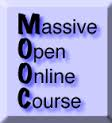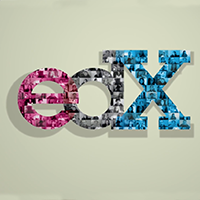As a rising high school sophomore in St. Petersburg, Fla., last summer, Curtis Brown III needed to brush up on the algebra he took more than a year earlier. But instead of hiring a tutor or reviewing textbooks, Curtis signed up for a MOOC – a massive, open, online course offered by a nearby community college.
And even though he only made it half-way through the free, self-paced course, it was more than enough, he said, to prepare him for more complicated math when the school year began. Now he’s ready to tackle pre-calculus.
“It did help,’’ said Curtis, who hopes to graduate high school with a diploma and an associate’s degree. “I used it as a refresher.”
MOOCs have been all the rage in higher education. And despite plenty of debate, they’re finding a place in K-12, too.
Supporters say much like colleges and universities, high schools can use MOOCs to more easily and cost-effectively supplement their curriculum. MOOCs offer classes with unlimited enrollment, potentially help students customize their learning and provide an opportunity to increase digital learning skills. They can also be another tool to help determine if high school students are ready for college-level courses and, if they’re not, to get them help before they spend time and money on remediation in college.
“The way we envision it, it’s in our best advantage to have these kinds of support tools,” said Jesse Coraggio, associate vice president of research and grants at St. Petersburg College, which is piloting a math MOOC for high school students and rolling out reading and writing MOOCs later in the school year.
Like other online platforms, such as Florida Virtual School, MOOCs allow students to work independently at their own pace. But while FLVS assigns teachers to students and offers live learning sessions, MOOCs typically feature recorded lectures and provide little or no interaction with instructors. Students usually don’t pay for a MOOC or receive credit for the course, though some colleges and universities are experimenting with the concept.
In Florida this year, lawmakers authorized MOOCs in high school subjects with end-of-course exams like Algebra I and Geometry. Providers must be approved by the state Department of Education and courses must be taught by Florida-certified teachers.
While those MOOCs are being developed, four Florida school districts, including Pinellas County, where St. Petersburg College is located, are testing MOOCs in other areas.
In Miami-Dade County, G. Holmes Braddock Senior High School has partnered with Miami-Dade College to pilot a MOOC in computer science. A teacher serves as a moderator, helping students work through the course in the classroom. In Sumter County, another high school used a MOOC temporarily while waiting for instructional materials so students wouldn’t fall behind.

MOOCs can help high school students make sure they're ready for college level courses, or prepare them for exams.
Broward College offers a MOOC as a primer in college-level reading, writing and math to help students prepare for a state-required college readiness exam. Since the course began in June, half of the participants have been Broward County high school students. With a $300,000 state Department of Education grant, the college is developing additional MOOCs that are game-based and aimed at increasing college readiness. Those courses should be available statewide in fall 2014.
St. Petersburg College rolled out its math MOOC in May, and has since had 2,100 students register. Most of them are recent high school graduates applying to the college. But some are enrolled in Pinellas high schools, like Curtis, who attends St. Petersburg Collegiate High, a charter school affiliated with the college. Every student coming into the charter’s 10th grade was encouraged to take the math MOOC over the summer.
Fourteen of 74 registered. Most seemed to like the course, school officials said, but a few told them they had difficulty getting feedback when they got stuck on a problem.
 MOOCs are a great way to offer students remedial help or support for more accelerated coursework, said Collegiate High Principal Starla Metz. But she doesn’t see them replacing teachers or standard classroom instruction. Many students still need that daily interaction, she said. She also is leery about offering high school students credits for MOOCs: “I think we’re still too early in the process,’’ she said.
MOOCs are a great way to offer students remedial help or support for more accelerated coursework, said Collegiate High Principal Starla Metz. But she doesn’t see them replacing teachers or standard classroom instruction. Many students still need that daily interaction, she said. She also is leery about offering high school students credits for MOOCs: “I think we’re still too early in the process,’’ she said.
Corragio agreed. “That’s the white elephant in the room,’’ he said. “What we do as institutions is validate learning. We need more than self-paced classes. Somebody still has to come up with a way to do the final assessment, monitor it and validate it. With MOOCs, it’s not so much about the new assessment model as it is about a different way to deliver content.’’
But credit-earning MOOCs are something Florida’s new digital learning law calls for in 2015-16. High school students can enroll in online classes and take them at their own pace. Or they can participate in a blended learning model that allows them to do some of the work at home, but with access to one-on-one classroom instruction. They also can receive credits toward promotion to the next grade and their diploma in subjects tied to end-of-course exams.
Such exams would be given at the school or at an approved testing center, said state Rep. Manny Diaz, R-Hialeah, who sponsored the legislation. “That’s the beauty of this,’’ he said. “The assessments are already there. And these courses don’t get funded unless the kid passes the EOC.’’
Diaz, a former district high school administrator, also sees MOOCs as a tool to help students pass the SAT or ACT, or give them access to professors from all over the country while taking Advanced Placement courses.
edX logo  It’s an idea the College Board and edX, a not-for-profit created by Harvard University and MIT, already have embraced. The pair is working with Davidson College in North Carolina to offer high school students online lessons in AP calculus, physics and macroeconomics. Some of the lessons, which will be piloted next school year, are interactive and include videos.
It’s an idea the College Board and edX, a not-for-profit created by Harvard University and MIT, already have embraced. The pair is working with Davidson College in North Carolina to offer high school students online lessons in AP calculus, physics and macroeconomics. Some of the lessons, which will be piloted next school year, are interactive and include videos.
It could be the start of a new breed of AP courses.
“We’re experimenting, but I still think it’s in the early days,’’ said Rebecca Petersen, director of research and educational initiatives at edX, which has 1.6 million students worldwide and offers 108 courses from 30 universities.
Teachers in the edX pilot can use MOOCs any way they want – with students signing up online, or accessing courses in a blended learning classroom. The latter setup would allow students to listen to lectures and do practice work before entering the classroom.
Over time, students likely will utilize the courses independently, Petersen said, but it’s really too soon to tell what the future holds.
“MOOCs are moving pretty fast,’’ she said. “People always ask me what it looks like five years from now. But really, it’s hard to see the next 12 to 18 months out.’’
As far as students earning credits for MOOCs, “that’s really up to individual districts,’’ Petersen said. “But once you get a few doing this, it starts to get credibility. Look at Florida Virtual School. Integrating more of a MOOC concept into virtual school isn’t that far off.’’
For all their promise, MOOCs have room to improve. Preliminary research on college students taking MOOCs shows some feel isolated and disengaged staring at a computer screen and working on their own. A blended-learning or flipped-classroom option might remedy that problem.
Another concern is more than 90 percent of students who sign up for a MOOC don’t finish it. Charging a fee and awarding credit likely would entice students to complete the course, supporters say. There are also misconceptions that could limit the potential of MOOCs – mainly that they’re designed to replace teachers and traditional schools.
That’s never been the intention, said Diaz, the Florida lawmaker.
“The way I look at it is MOOCs are just another tool in the tool box,’’ he said. “Why would we ever want to limit our students from advancing? Why limit their ability to get themselves more prepared? We have to provide them with the opportunity to excel.”